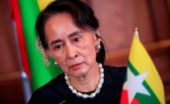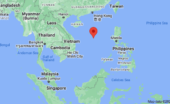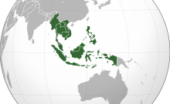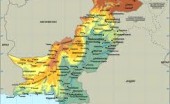Johannah Bernstein post: "eternally proud of my father’s extraordinary aeronautical engineering. legacy. here is a photo of the Canadair Water…
Asia Government & Governance
Written by Diana Thebaud Nicholson // September 15, 2025 // Asia, Government & Governance // Comments Off on Asia Government & Governance
12-15 September
New Nepal interim ministers sworn in after protests
Kathmandu (AFP) – Nepal’s new interim prime minister unveiled her first ministers Monday, as the Himalayan nation seeks to restore order after deadly youth-led anti-corruption protests that ousted the previous government.
Protests, sparked by a ban on social media and feeding into long-standing economic woes, began on September 8 and quickly escalated, with parliament and key government buildings set ablaze.
It was the worst unrest since the end of a decade-long civil war and the abolition of the monarchy in 2008.
At least 72 people were killed in two days of protests, with 191 still recovering in hospital, according to government figures.
Prime Minister Sushila Karki, the 73-year-old former chief justice, has been tasked with addressing protester demands for a corruption-free future ahead of elections in March.
Om Prakash Aryal, an advocate known for his cases tackling corruption, governance and human rights, takes the critical home minister post, as well as law, justice and parliamentary affairs.
Kulman Ghising, the former director of the Nepal Electricity Authority — who is widely credited with ending the country’s long-standing load-shedding problem — has the energy, infrastructure, transport and urban development portfolios.
Rameshwor Khanal, a former finance secretary and a respected economist, was handed the key finance post, a challenging task to tackle the unemployment woes that drove the uprising.
A fifth of people in Nepal aged 15-24 are unemployed, according to the World Bank, with GDP per capita standing at just $1,447.
Exclusive: Young activists who toppled Nepal’s government now picking new leaders
By Aftab Ahmed and Hritam Mukherjee
Hami Nepal used Discord app to mobilize protests
Sudan Gurung and team propose cabinet changes, focus on youth involvement
Protests against corruption lead to 72 deaths, over 1,300 injured
(Reuters) – A former DJ and his obscure Nepalese non-profit used a social media app popular with video gamers to drive massive protests and become the unlikely power brokers in installing the country’s new interim leadership.
Sudan Gurung, the 36-year-old founder of Hami Nepal (We are Nepal), used the Discord messaging app and Instagram to mobilise massive demonstrations that forced Prime Minister K.P. Sharma Oli to resign, in the deadliest political crisis to hit the Himalayan nation in decades, a dozen people involved in the demonstrations said.
Nepal’s president appoints interim premier after fiery protests collapse previous administration
Former chief justice Sushila Karki will be 1st woman to head Himalayan nation’s government
Nepal’s former chief justice Sushila Karki has been chosen as the country’s interim leader, said an official from the Nepalese president’s office, after violent anti-corruption protests forced Prime Minister K.P. Sharma Oli to resign this week.
Karki, 73, the only woman to have held the post of chief justice of the Supreme Court of Nepal, will take oath on Friday, Archana Khadka Adhikari, information officer at the president’s office, said.
The Himalayan nation’s worst upheaval in years, which killed 51 people this week and injured more than 1,300 as police fought to control crowds, was sparked by a social media ban, now rolled back. The violence subsided only after Oli resigned.
Wedged between India and China, Nepal has grappled with political and economic instability since the abolition of its monarchy in 2008, while a lack of jobs drives millions to seek work in other countries and send money home.11 September
‘Wars, disasters, displacement, hunger’ continue to burden Myanmar
Millions of people in Myanmar “live in daily fear for their lives,” said the head of the UN refugee agency on Thursday, following a three-day visit to the conflict-ridden country.
(UN news) Four years after the military coup which deposed the democratically elected government, Myanmar’s civil conflict grinds on, leaving millions displaced and without a home.
“The suffering of millions of people across Myanmar is immense,” said UNHCR chief Filippo Grandi. “With aerial bombardments, destruction of property, and forced recruitment, they live in daily fear for their lives.”
He added that “civilian men, women and children must be protected from violence, and solutions found so that they can choose to return home in safety and dignity.”
Thousands of people also had their homes destroyed after floods swept through many regions in July.
Wars, disasters, displacement, hunger: the forgotten plight of so many people in Myanmar, like the Rohingya, never ends,” Mr. Grandi said in a post on X.
In the last year and a half, 150,000 Rohingya, a mainly Muslim minority in the majority Buddhist country, have fled to neighbouring Bangladesh. This marks the largest exodus to the country since 2017, when 750,000 Rohingya sought refuge from the violence in Rakhine state.24 May
Why the future of Bangladesh’s Muhammad Yunus administration is uncertain
Political discord over when to hold elections and growing tensions with the armed forces have left the interim government hamstrung, observers say.
(Al Jazeera) On the surface, it was a routine closed-door meeting between Bangladesh’s interim leader and Nobel laureate Muhammad Yunus and the chiefs of the country’s three armed forces, to discuss law and order.
But the May 20 meeting came amid what multiple officials familiar with the internal workings of the government described to Al Jazeera as an intensifying power struggle in Dhaka. Portrayed in social and mainstream media in Bangladesh as a “cold war” between the armed forces and the interim administration, these tensions now threaten the future of Yunus’s role, nine months after he took charge following the ousting of former Prime Minister Sheikh Hasina and the ruling Awami League.2024
5-7 August
Nobel laureate Yunus tapped to lead interim B’desh set-up
• President dissolves parliament on student leaders, BNP demand
• Military reshuffles several generals, sacks Rapid Action Battalion chief
• 10 killed in clashes on Tuesday as Hasina’s supporters targeted
(DAWN) Bangladesh’s Nobel-winning microfinance pioneer Muhammad Yunus has been tapped to lead an interim government after mass protests forced longtime prime minister Sheikh Hasina to flee, the presidency announced early Wednesday.
Nobel Laureate [Muhammad Yunus] Tapped to Lead Interim Government in Bangladesh
The new government was formed a day after Bangladesh’s longtime leader, facing fierce protests, fled the country.
The president of Bangladesh on Tuesday appointed Muhammad Yunus, a pioneer in microfinance who is a Nobel laureate, to oversee an interim government, accommodating demands by protesters and offering a reprieve for a country scarred by violence.
… Mr. Yunus, 84, is expected to lead a temporary government now that the Bangladeshi Parliament has been dissolved. … [He] has two immediate tasks.
First, he will have to restore order to a country of 170 million people that has been roiled by weeks of student protests and violent clashes with security forces that have killed more than 100 people.
And second, he will have to define the role of the interim government and what its mandate will be until Bangladesh holds elections to choose a new leader.
Bangladesh PM Sheikh Hasina flees, army says interim government to be formed
PM Hasina resigns and flies to India
Hasina left for own safety, says son
Army chief says interim government will be formed soon
Thousands celebrate in streets of Dhaka
Hasina resignation follows violent protests
(Reuters) – Bangladesh Prime Minister Sheikh Hasina resigned and fled the country on Monday after hundreds of people were killed in a crackdown on demonstrations that began as protests against job quotas and swelled into a movement demanding her ouster.
How Protests Ousted Sheikh Hasina, and now Bangladesh Faces Dire Danger
By Joshua Kurlantzick, Senior Fellow for Southeast Asia and South Asia
(CFR) After Sheikh Hasina and her long-ruling, increasingly authoritarian Awami League seemingly crushed a first round of protests related to set asides for relatives of independence war veterans several weeks ago in Bangladesh, through massive arrests, torture, and murders, there was a degree of forced calm in the streets of Dhaka and other parts of the country.
Bangladeshi PM Sheikh Hasina resigns as widening unrest sees protesters storm her official residence4 August
Thailand’s progressive Move Forward party might be dissolved, but its former chief remains hopeful
(AP) — The charismatic Thai politician who led his young, progressive party to a stunning general election victory a year ago is urging supporters not to lose hope, even if the party is disbanded by a legal order.
Thailand’s Constitutional Court will rule Wednesday [7 August] on whether the Move Forward Party violated the constitution by proposing to amend a law that forbids defaming the country’s royal family. A petition to the court requested the party’s dissolution and a 10-year ban on political activity by its executives, including former chief Pita Limjaroenrat.
Move Forward won the most seats in the 2023 election, but was blocked from taking power and now heads the opposition. Pita was denied the prime minister’s job by the military-installed Senate, a power it was given in the constitution adopted in 2017 under a military government.16 May
Thailand’s Government Promised Change. It’s Delivering Chaos
By Joshua Kurlantzick, Senior Fellow for Southeast Asia and South Asia
The government of Prime Minister Srettha Thavisin has done little to address Thailand’s pressing issues, and now, after a Cabinet reshuffle and high-profile resignations, it seems to be in chaos.
(Council on Foreign Relations) In late April, less than a year after his government took office, Thai Prime Minister Srettha Thavisin announced a Cabinet reshuffle. The news was accompanied by the abrupt resignation of Foreign Minister Parnpree Bahiddha-Nukara and followed by the resignations of Vice Foreign Minister Sihasak Phuangketkeow and Deputy Finance Minister Krisada Chinavicharana last week.
In the immediate aftermath of what was the country’s first relatively free election since the end of military rule in 2018, Move Forward, the reformist party that won the most Lower House parliamentary seats in the polls, was never given a real chance to form a government. Before leaving power, the junta had crafted a new constitution by which a party had to win not just a majority in the Lower House to take power, but rather a majority of the combined Lower House and Senate. Given that nearly all the fairly conservative senators owed their place in the Upper House to the former junta, Move Forward, which had vast support among Thailand’s youth, had no chance.9 May
Vietnam’s political turmoil reveals a turn towards China – and away from the West
Following a power struggle within the Communist Party of Vietnam, it is clearer than ever that its new hard-line leadership has no interest in confrontation with China or being part of an ‘anti-China’ coalition.
Dr Bill Hayton, Associate Fellow, Asia-Pacific Programme, Chatham House
In just a few weeks, the Communist Party of Vietnam (CPV) has shredded its reputation for boring political stability. A long-running power struggle, disguised by a wider anti-corruption campaign, has resulted in the sudden sacking of both the country’s president, Vo Van Thuong, and the chair of the National Assembly.
The outcome of this fight should cause those who still hope that Vietnam could join an ‘anti-China’ coalition to think again. Although this power struggle is not about foreign policy, it will result in a turn towards China and away from the West.



